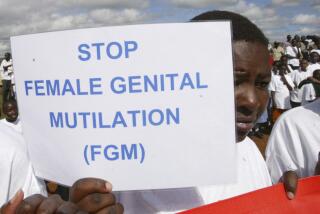Ending a Dangerous Ritual
- Share via
Bogaletch Gebre, a tall, soft-spoken woman in her late 40s, runs the Kembatta Women’s Center, a collective in her native Ethiopia dedicated to ending the ancient practice of excising girls’ external genitalia.
The World Health Organization says at least 130 million females alive today have been subjected to this painful, ultimately numbing practice. Usually this is done in a ceremony that many people in Ethiopia, Egypt, Guinea and other African nations view as a form of purification. In many regions, marriage is taboo if a girl is “uncut.”
Gebre is trying to educate Americans about the practice, inflicted on 2 million girls a year. But the former Fulbright scholar and teacher, who endured the ritual as a girl without anesthetic, emphasizes that neither well-meaning foreigners nor a nation’s own government can make the issue go away.
Gebre’s center, along with other nongovernmental groups guided by the WHO, try to combat the problem directly by showing villagers graphic videos of the bloody practice and by training teams of villagers to conduct community outreach campaigns on public health dangers (gravest among them: the instruments used to perform the practice often spread HIV).
“We need to find solutions within our own culture,” Gebre says. “If you are going to take away this sacred part of their life, then you have to give them something in return.”
Gebre, who learned to read by campfire after she finished her daily chores, emphasizes that the most effective way to eliminate female genital excision is to give African girls options they don’t have today. For instance, the center is pushing for the construction of reservoirs and bridges in Ethiopia. Hauling water, Gebre explains, is the most time-consuming responsibility for girls and women in her country. The longer they must travel to get it, the less time they have for school. And the less education they have, the more likely they are to yield to this dangerous tradition.
There is evidence that the approach works. Last month, more than 2,000 people in an Ethiopian community called Hobich-Haka (Forest of the Lions) attended the area’s first wedding in which an uncut girl was publicly married. Ethiopian television broadcast the ceremony in the region’s Amharic and Oromo dialects. “Everybody,” Gebre says, “is still talking about the courageous young couple.”
Westerners can best help Africa find its own path away from mutilation rituals by supporting projects with a holistic approach to women’s well-being and encouraging the U.S. government to do the same. Citing an Ethiopian proverb, Gebre says: “When threads unite, you can tie down a lion.”
To Take Action: Contact the center through Parents International Ethiopia at (213) 833-6314.
More to Read
Sign up for Essential California
The most important California stories and recommendations in your inbox every morning.
You may occasionally receive promotional content from the Los Angeles Times.













